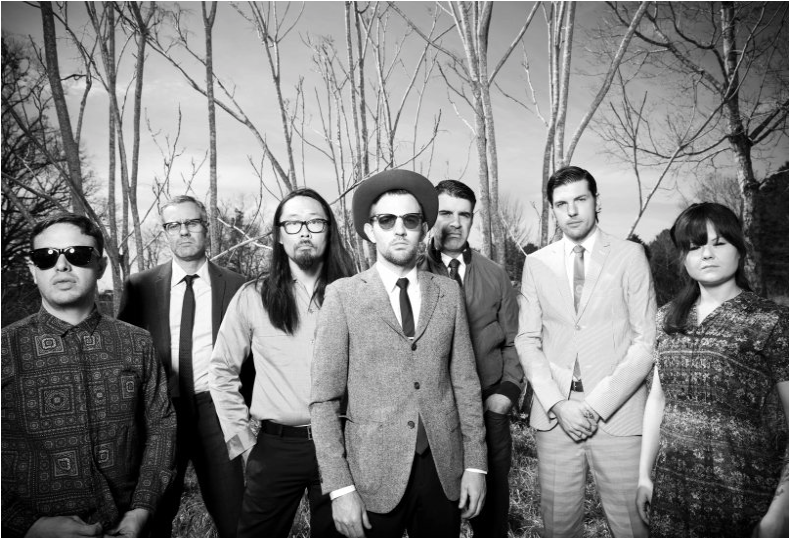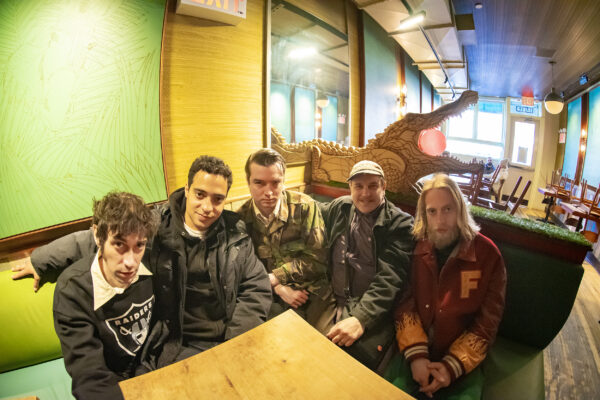When they move towards their microphones and close their eyes, The Avett Brothers put forth a collection of voices whose bond exceeds any bloodline or namesake. A band of brothers both literally and figuratively, founding members Scott Avett, Seth Avett and Bob Crawford have built and honed a sound that has never really stopped evolving. Continuing to draw on a variety of styles, the soul-tinged stomp of the newly premiered “Ain’t No Man,” marks yet another new direction that will culminate with their ninth full-length studio album, True Sadness. Scheduled for release this upcoming June 24th, the record was completed with the full line-up of their band, which includes cellist Joe Kwon and touring musicians Paul Defiglia, Tania Elizabeth and Mike Marsh.
Speaking to Pancakes and Whiskey by phone the morning after their first of three consecutive nights at the Chicago Theatre, Crawford discussed their expanding line-up, finding meaning in their success and how the roots of their new single stretch back several years. “As far as the genesis for the song, Scott had this idea or Scott had written I guess a large part of the song many years ago, but he didn’t really buy into it. He didn’t believe it. He didn’t believe what it said,” he remembered. Although by the time they began compiling ideas for their forthcoming record, the time to revisit the track had finally felt right. Explaining how it took shape during the album’s earliest demo sessions, he revealed that the group’s songwriters had ignited the first spark almost by chance.
“Scott and Seth went into the studio by themselves for a few days and this was the last thing they did, the last day at the studio. It was kind of this catching a little smoke in the bottle. It was just a little magic moment because Scott sang the bass line and Seth just kind of made it up as he went.” Describing the band’s conscious effort to keep the energy and feel of that recording once official sessions began, he spoke about the importance of keeping its “party vibe.”
“There was a lot of talk about would I play it, would Seth play it, would Paul play it, like how were we going to do this? And it came down to Scott and Seth did it the way they did it initially, to keep that initial vibe because the demo recording is so great. It was a really close way to replicate it. Then the idea of the claps and the group singing together, that came in the days after getting the initial bass and vocals down.” Later outlining their approach to choosing which songs are right for each album, Crawford talked about their prolific nature and how the recording period tends to last two or three years, while the writing process “never really stops.”
“It’s really difficult to figure out what we’re going to record. That reveals itself as you’re going through the process and you’re playing songs and rehearsing songs. They kind of weed themselves out. For us, the challenge is not taking too many in and we even did it this time. We took in more. We said we were going to go in with twelve, we probably went in with twenty (laughs). So, I mean a lot of it’s just that Scott and Seth are just so darn prolific and writing is just a daily exercise. And so when you have that situation, we’re never of want of songs. There’s always, always songs and for years after this band, whenever this band stops for whatever reason, the songs will keep coming.”
One place that prolific nature is on full display is the stage. Cycling through compositions that illustrate the story and growth of the band, they seem to revel in playing everything from songs so new they’ve yet-to-be-released, to diving back into those that were written long before they were known outside their home base in North Carolina. And while the image of Crawford alternating between an upright and electric bass remains a familiar sight for the legions that see them in concert, he admitted that his original interest in the instrument had occurred unexpectedly.
“It was actually an accident,” he said. “I was playing guitar and singing in, I guess for a lack of a better word, a jam band in Charlotte in the late 90s.” After buying and returning a vintage guitar, the store gave him a credit to use towards his next purchase. “I was walking out the door and there was an upright bass standing there in front of me and I bought that, completely on a whim,” he recalled. “I lived in a house with five guys at the time, and there was jam sessions on the back porch on Friday and Saturday nights. I thought that the bass player guys who came over, they could play it because often when you get that late night jam, there’s not electricity involved.” Finding it to be a lot of fun, he soon began using it himself. Yet through the years, the group’s expanding roster has allowed him to explore many different avenues. “We have a bass player who’s me, then we have a great bass player in the band who’s Paul Defiglia, and so that has allowed me to chase down my whims of playing the fiddle or playing the viola or playing the mandolin,” he said with a laugh. Noting how he played an electric bass, an upright bass, a fiddle and a viola during the group’s show the night before, he spoke about how those opportunities satisfy an inherent musical craving to try something new. Although as he explained, going from a three-piece to a seven-piece band has also fundamentally transformed their approach to live performing.
“It’s liberating in a few ways. The first way it’s liberating, which is -it kind of took us a couple years to accept that this was actually liberating and not confining- is you play less. Everybody plays less. Now, you got to think: me, Scott and Seth, we were three guys against the world up on stages together and so we always were playing more, playing so many notes it was just ridiculous. And if you add four more people to that and you’re playing what you were playing when it was three people, it’s going to sound like a mess (laughs). So what we keep, I mean even back down to last night, there’s this practice of, this conscious effort: we’re going to play less tonight. If everybody plays less, it sounds so much better. That’s such a lesson for young [musicians], I’m talking about school age musicians or people in their teens or even in their twenties. It’s the idea of less is more. It’s such a conventional piece of wisdom, but it’s so hard to accept. It’s like a lot of things your parents will tell you as you’re growing up that you don’t want to listen to. Then you get older and you realize that they were probably right about that stuff. It’s a matter of that. So that is one and that’s a freeing element- playing less is a freeing element.”
Reflecting on the wave of optimism that surrounds much of their work, Crawford spoke about the emotions that lie at the heart of their music. “I don’t think we’d still be together if there wasn’t this overall want of positivity and hopefulness to what we do,” he began. “That makes it meaningful. That makes everything we do. Playing music, there’s something that’s good for the soul, good for the body. Playing music is just good for you, I believe. Whether it’s death metal or it’s Christian music, it’s still good for you. It’s still a good thing to do. It is exercise- it’s a soul exercise. But the fact that we’ve done it and the overall message is just so ultimately redeeming and hopeful and positive, it’s very gratifying.” Above all, he said that regardless of any success they have had or what lies ahead, he will always be proud that “we did it in a good way in that we moved towards the light,” before adding, “we’re not always getting there, but we’re always trying to get there.”
True Sadness is available online and in-stores on June 24th
Don’t Miss The Avett Brothers in Philadelphia & New York:
5/14 @ Mann Center For Performing Arts, PA
6/05 @ Mountain Jam Festival, NY
7/07 @ Landmark Theatre, NY
7/08 @ Chautauqua Amphitheater, NY
8/13 @ The Amphitheater At Coney Island Boardwalk, NY
Check back with Pancakes and Whiskey for coverage of their Philly show
Article: Caitlin Phillips




